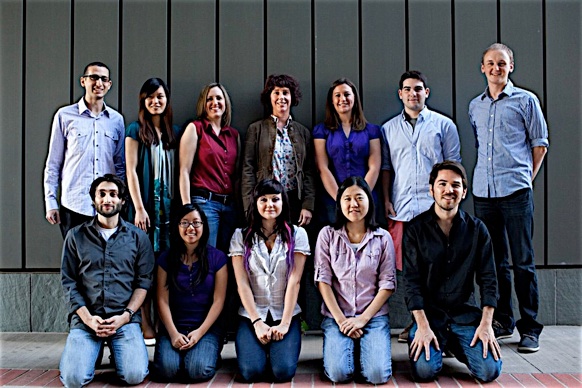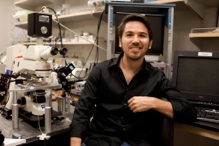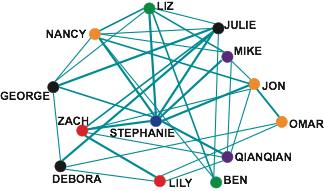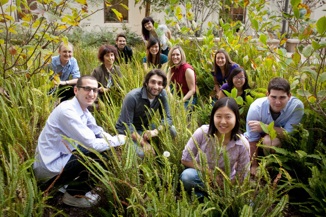


Our Lab

Stephanie A. White, Ph.D.

Stephanie White majored in biopsychology at Connecticut College, then obtained her Ph.D. in neuroscience from Stanford, followed by postdoctoral work at Duke. Throughout, she has used a neuroethological approach to understand how social interactions shape the brain. Her own lab studies songbirds to investigate how the environment influences one’s learning and creativity. Recently, humans have entered this comparative framework with collaborative exploration of the speech-related gene, FoxP2, in human and songbird vocal learning.
Julie Miller, Ph.D.
Julie is an Assistant Researcher in the White laboratory. She majored in Biology and History at Wellesley College, and then earned her Ph.D. from the the University of Arizona, Tucson. She uses the zebra finch model to investigate behaviorally-driven changes in molecules and gene networks in the basal ganglia. Her long-term goal is to identify and characterize novel dopaminergic and non-dopaminergic pathways underlying vocal dysfunction associated with motor diseases such as Parkinson's Disease. Thus, as a first step, she is investigating a potential molecular target of dopamine regulation through an independently funded NIH R03 grant. [CV]

Nancy Day, Ph.D.
Nancy joined the White lab in Spring 2012. As an undergraduate, she went to Whitman College and double-majored in Biology and Psychology. She completed her Ph.D. at the University of Minnesota, in the birdsong lab of Dr. Teresa Nick, where she examined cortical circuit dynamics of the song nucleus HVC in juvenile and adult zebra finches. For her postdoctoral work, she is investigating if adult maintenance of learned song is regulated by the language-related gene FoxP2. As a hobby, Nancy breeds, raises, shows, and enjoys her Old-Style Siamese cats.

POSTDOCS
GRADUATE STUDENTS

Michael Condro
Mike is a Ph.D. student in the MCIP program. He graduated from Cornell University with a B.S. in Biology with a concentration in Neurobiology and Behavior. In the White lab, he focuses on the role of an autism susceptibility gene, contactin-associated protein-2 (Cntnap2), on vocal behavior in songbirds. Using viral-mediated expression of RNA interference in songbirds, he hopes to gain insights into the role Cntnap2 plays in learned vocalizations and how that may relate to language deficits associated with autism spectrum disorders and specific language impairments in people.

Zachary Burkett
Zach is a Ph.D student in the Molecular, Cellular, and Integrative Physiology program. He graduated from California State University, Long Beach, in 2008 with a B.S. in Zoology and minors in Physiology and Chemistry. While an undergraduate, he worked as an animal trainer at the Aquarium of the Pacific in Long Beach, California, where he also studied the social dynamics of within a changing exhibit population of California sea lions and harbor seals. Zachary then joined the White Lab in 2008 and completed a M.S. degree in Physiological Science in 2010 by developing the zebra finch as a model system for Parkinson's disease.

Qianqian Chen
Qianqian started the MCIP graduate program in Fall 2010. Originally from China, Qianqian completed her undergraduate degree in Biological Science in 2006 from Chu koChen Honors College at Zhejiang University near Shanghai. She received a scholarship from the Chinese Scholarship Council to pursue her Ph.D. research at UCLA. In the lab, Qianqian studies behavior-driven regulation of FoxP genes in Bengalese fiches. Outside of the lab, Qianqian is the leader of ‘UCLA Cfan’, a Chinese drama club, and directed their first production.
Elizabeth Fraley
Elizabeth is a 4th year graduate student in the MCIP graduate program. She attended Virginia Commonwealth University for her undergraduate degree in Biology and Psychology. Her thesis research explores the role of the reelin signaling pathway in both learned vocalizations (zebra finches), and in innate vocalizations (mice). In humans, deficits in reelin signaling have been linked to autism. Liz is also a trained dancer, and can often be found performing in and around Los Angeles.
Jon Heston
Jon is a Ph.D. student in the Neuroscience program. He joined the lab in Spring 2010 after obtaining his B.S. in Neurobiology and Behavior from UCI. Broadly speaking, his interests are in understanding the molecular, cellular, and circuit mechanism underlying procedural forms of learning. Specifically, his project involves the use of viral-mediated gene delivery to explore the role of FoxP2 in behavioral and cellular/synaptic plasticity. Outside the lab his interests include playing music, distance running and home brewing.
George Hafzalla
Omar Casillas

Debora Lee
Debora is a Junior at UCLA and is majoring in Biology. She joined the lab in the fall of 2010 and is currently studying the link between vocal deficits and the depletion of dopamine in a zebra finch model for Parkinson’s disease.
Ben Schwartz
Ben is a first-year Neuroscience major at UCLA and joined the lab in the fall of 2012. He’s exploring the role of the reelin signaling pathway in vocal behavior.
Lily Sung
Lily is a fourth year biophysics major. Since joining the White Lab in the Fall of 2010, she has been working to find genes involved in vocal learning. Outside of the lab, Lily is a cellist interested in the fusion of musical genres, and an editor for ALEPH Journal, UCLA’s undergraduate research journal in the humanities and social sciences. She intends to attend medical school after graduation.
Eric Curry
Eric is a second year biochemistry major. At UCLA, he is involved in several student organizations, including the Student/Chancellor's Giving Circle, Bruin Guardian Scholars, and the Pre-Vet Society. Born and raised in San Francisco, he is an avid Giant's fan!. After college, he plans to attend veterinary school and perhaps specialize in pharmacy. In his free time, he enjoys swimming and exploring LA with his friends.

UNDERGRADUATES












